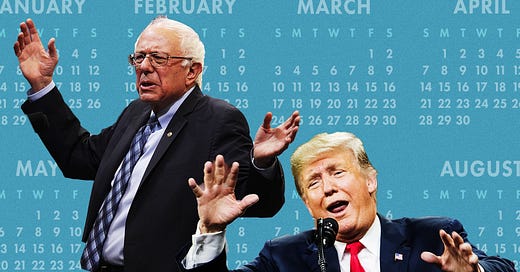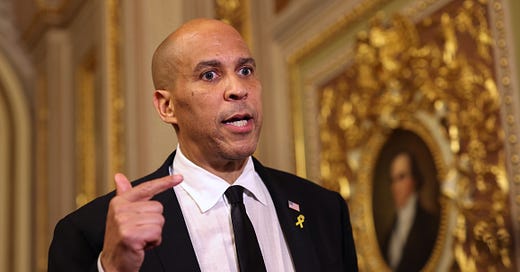
Down With the ‘Binary Choice’ Nonsense
An election is a choice of timelines, not people or ideologies.
My buddy Sarah Longwell had a great piece over the weekend warning Dems that Bernie 2020 looks a lot like Trump 2016.
The nub of her argument is that:
Sanders is pulling a consistent 20 percent.
He's raised $18 million ...
From 525,000 individual donors.
His supporters are strong supporters, many of whom have already voted for him for president once.
He's already the second choice of Biden, Warren, Beto, and even Klobuchar (!?!) supporters.
In short: Sanders is in an extremely strong position and if the other candidates don't take him seriously, he is likely to be the nominee.
You should read the whole thing.
There's a corollary to Longwell's piece that is worth exploring: Not only do I think Sanders has a very good chance to win the nomination—I think he could beat Trump in the general election, too.
If you look at the general election matchup polling, Sanders isn't as strong as Biden or Beto, but he’s stronger than Elizabeth Warren or Mayor Pete. Yes, this is probably a function of name-ID. But even so, at this point it’s fair to say that Sanders performs about as well as the average Democrat.
That said, I suspect he'd perform differently than the average Democrat. Which is to say, he might get the same percentage of support, but that his support would be distributed differently in a general election.
For example, I suspect Sanders would be weaker with African-American voters than the replacement Democratic candidate. But he might well be stronger with working-class white voters.
So a Sanders candidacy would be aimed straight at the heart of the Trump coalition. It would make it harder for the Dems to get North Carolina. It might put Virginia in play. Forget about getting Texas. But Wisconsin, Michigan, Pennsylvania, Minnesota? Those could, in theory, become stronger for the Dems.
We should be mindful of that fact that if Sanders pulled 48 percent of the popular vote, it would probably be a different 48 percent than Biden or Beto or Harris would pull.
Among the Democratic candidates, he would not be the strongest possible matchup. I suspect that, after Elizabeth Warren, he would be Trump’s preferred opponent. But he could still win. What would his chances be? I'd put them somewhat less than a coinflip; between 1-in-2 and 2-in-5.
***
All of that said, let me ask two questions, one of Obama voters and one of Trump voters.
Obama voters: If you could go back to 2012, knowing what you know now, would you still vote for Obama?
Because we now know that the timeline created by Obama's 2012 election meant handing unified control of government to a Republican party with Donald Trump as president. So net-net, would you rather have had Mitt Romney as president and the Republican party kept in a moderate place? Or would you still take an extra four years of Obama, even though it means getting Trump?
Trump voters: If Bernie Sanders is elected president and he is given unified Democratic control of Congress (which is what he'll likely have if he were to win), will the Trump presidency still have been worth it? Net-net, would you rather have had Hillary Clinton constrained by a Republican Congress in 2017? Or would you still take four years of Trump, even though it means handing the country over to a socialist?
The reason I ask these questions is to make a point about the "binary choice" trope.
It drives me crazy when people say that an election is a "binary choice."
When people trot out the binary choice, they're trying to reduce the election to two defined choices whose outcomes are totally understood. They want to pretend that you know exactly what outcome you're getting with either choice and that the outcomes stop the minute the choice is made.
In truth, an election is a choice of timelines, not people or ideologies.
And those timelines are unknowable and uncertain. They're contingent. They stretch out into the future.
Parts of these future timelines are reasonably foreseeable: You could reasonably predict that a Clinton victory in 2016 still would have been accompanied by a Republican congressional majority. And from that you could reasonably predict that Clinton would have been a constrained chief executive.
Other parts of these timelines stretch over the horizon.
I'm not saying that 2012 Democrats should have known that Obama's re-election would necessarily radicalize the Republican party. Or that Republicans should have known Trump's 2016 election would necessarily radicalize the Democratic party.
But I am saying that both of those possibilities were obvious at the time and that anyone who insisted that good partisans had to vote a certain way because it was a binary choice were either being disingenuous or blinkered.
When you vote for a candidate, you're not choosing a specific outcome. You're choosing a timeline, the costs and benefits flow downstream, like a river, for a very long while. And there is no simple math that gives you an obvious, ironclad, definitive answer.
Reasonable people who share the same goals can come to different judgments about which timeline is likely to deliver the better results, on balance.
But there is no "binary choice."
I suspect that Democrats, faced with the the last three years of Trumpism, appreciate this fact now. Part of me hopes that Bernie Sanders becomes president just so Republicans learn the lesson, too.











